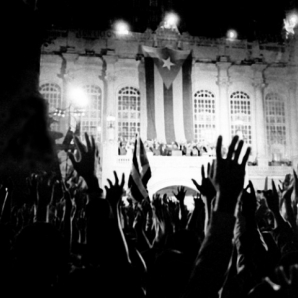
Diario de Cuba, Orlando Freire Santana, Havana, 28 September 2015 – Recently a group of friends were talking about the way the Cuban government leaders, during those first years of Fidel Castro’s Revolution, were maneuvering until achieving the establishment of a Marxist-Leninist-type totalitarian system. At one point in the conversation, one of the participants threw out the following question: Could those firecrackers that went off that night of 28 September 1960, when Castro founded the Committees for the Defense of the Revolution (CDRs), been spontaneous, or was it merely a matter of self-provocation?
That year, even without the socialist character of the Revolution having been declared, already the authorities were taking giant steps to annihilate civil society. By that time, the opposition press had disappeared almost completely, and the state’s takeover of the economy would proceed apace through the nationalization of foreign-owned businesses, and the confiscation of large property-owners’ holdings across the nation. But Fidel Castro liked to wrangle with words – that is, to hint that his actions were a response to The Enemy’s aggressions.
Thus things went, and at the moment when Castro delivered a speech in the old Presidential Palace after having attended the sessions of the United Nations General Assembly, two firecrackers went off. Immediately, and in response to those explosions, the Maximum Leader declared that “we will put in place, before Imperialism’s campaigns of aggression, a collective revolutionary surveillance system, so that everyone will know who lives on the block and what relationship he had with the Tyranny, and what he does for a living, with whom he associates, and the activities in which he is involved.”
Truly, it is hard to believe that such a sophisticated method for denouncing every person who is opposed to or acts against the government could have been conceived by Castro at the very moment in which he was piecing together his speech. Anyone would say that on that day, simply put, a monstrosity was revealed that had been already carefully wrought.
Thus were born the Committees for the Defense of the Revolution (CDRs), an organization that has marched in time with its progenitors. Without a doubt, the Committees had their best moment—as far as the government’s interests are concerned, of course—during the first three decades of the Revolution. But they fell spectacularly starting in the 1990s, with the advent of the “Special Period in Time of Peace.”
At this time, at the grassroots level—on city blocks and in neighborhoods—the CDRs barely function: the CDR members’ monthly meetings don’t take place; almost nobody takes on guard duty in the blocks; there is no more collection of raw materials (that task is now performed by the self-employed); and there are very few Committees who celebrate on the night of September 27, the eve of a new birthday of the organization.
However, what hasn’t fallen by the wayside is the collection of membership dues. During the month of January, the members are required to pay the year’s dues in advance, thus providing the revenue that, among other things, funds the maintenance of the organization’s parasitic structures at the municipal, provincial and national levels.
Even so, the machinery of power does not give in, and it does not waste an opportunity to sing the CDRs’ praises. To do this they dispatch the retinue of Carlos Rafael Miranda, national coordinator of the CDRs, across diverse territories of the country to pass out diplomas and certificates, and to harangue the young people so that they will assume responsibilities in the various structures of the CDR. And, of course, they also call meetings where high-level authorities of the Communist Party (PCC) and the hierarchy of the CRDs converge. One of these was the Fourth National Plenary of the CDRs which met in recent days.
At that conclave, José Ramón Machado Ventura, second secretary of the PCC, said that “the Committees for the Defense of the Revolution are strengthening and will reach their 55th anniversary with important achievements and perspectives.” Even so, upon remembering (or upon somebody whispering in his ear) that the CDRs are practically non-functioning at their base level, Machado noted that “the system for reporting and making denunciations must be reinforced for the prevention of, and battle against, illegalities, crimes and social indisciplines”—a tacit acknowledgment that the power elite is dissatisfied with the level of snitching that the CDRs are currently exhibiting.
There was finally consensus among those friends who were recalling that night in 1960 that not even 100 firecrackers, such as those that went off on 28 September, would be enough to revive a patient who is in an irreversible coma and is waiting only for the machines that are artificially prolonging his life to be turned off so as to definitively die.
Translated By: Alicia Barraqué Ellison
